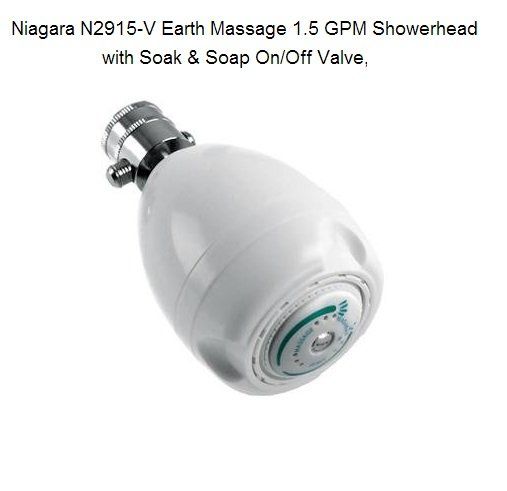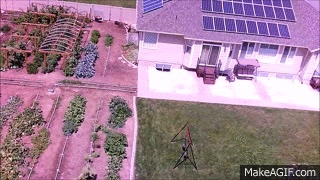Thursday, June 23, 2011: Updated 12/11/2015
I live in the desert landscape of the Wasatch front in northern Utah. I say desert because that is what it used to be when the Mormon pioneers settled here almost 164 years ago. Those early pioneers took a dry piece of desert land and transform it into a fruitful, lush, green oasis. Today over 2 million people live here and it is a beautiful, green, mountainous landscape.
If we expect to sustain our American lifestyle on such a finite water resource we all have to start being more conservative. It is possible for all of us and our children to have luxuries and amenities. We just have to be smart with how we use our resources.
Use low-flow shower heads: Updated 8/3/2013
In my opinion, the best low-flow shower head on the planet has to be this one: It is amazing!

It gives a nice powerful stream but only uses 1.5 gpm. It also has a valve that backs off the flow to only 0.75 gpm for those days when you should get out of the shower but you just want to stay in and bask in the warmth for a while longer.
Having a lower flow shower head is good practice but you can even take it a step further. Hop in the shower, get wet, rinse off, then turn off water. At this point, take your time lathering up and scrubbing yourself clean. When done, turn the water back on and rinse off. You will only use 2-5 gallons for your shower. Without the water washing the soap away before it has had a chance to do its job, you will get cleaner and use less soap in the process.
Drain Water Heat Recovery:
It takes a lot of energy to heat water. It's a shame that all that energy ends up going down the drain.
By using a Heat-recovery drain pipe, one can recover 50-70% of that wasted energy. When water runs down a vertical pipe, rather than falling down the center very quickly, it glides down the inside wall of the pipe. In a heat recovery drain, a section of vertical sewer pipe is replaced with a thermally conductive copper one, a smaller copper culinary water pipe is wrapped around the copper sewer pipe. In this manner, heat from warm waste water (and nothing else) is transferred to the cold water on its way to the water heater. A typical system costs about $600-$1000 and the pay off ranges from 3-8 years depending on how much hot water you use. Heat from shower water is easily reclaimed because there is a continual flow of warm waste water preheating the continual flow of cold water entering the water heater. I want to install one of these someday. The lower the flow of the shower, the more efficient they are.
Update: I installed a DWHR unit on 9/2/2013.

Use an efficient washing machine:
Spend a little extra up front and save a bunch throughout the life of the appliance. Energy Efficient washing machines will save you thousands of gallons of water each year and reduce the energy consumed drying clothes because they spin clothes faster making them drier.
Back in 2010, we replaced our old, warn out washing machine and electric clothes drier with an energy efficient, front loading washing machine and a gas drier.

Our electric bill went down 120 kWh/month by drying 8 loads/week with gas instead of electricity. But to my surprise, our natural gas bill also went down. Even though the clothes drier now runs on natural gas, the washing machine uses so little water now (2.2 gallons/load) that the water heater doesn't have to heat up nearly as much water to feed the washing machine. The result is a net reduction in electricity and natural gas consumption.
Update 9/30/2013:
Originally we went with a gas clothes dryer to reduce our electric usage and allow the solar panels to cover all our electric needs. Since that time, our house has gotten a lot more energy efficient. After installing a Geothermal heat-pump, and switching to electric cars, the paradigm in our household has completely shifted. We now want to stop using fossil fuels completely. Ironically, our new clothes drier is the only remaining fossil fuel appliance we use on a daily basis.
Update 6/14/2015:
We have converted back to an electric clothes dryer with some interesting additions. We have also canceled our natural gas service.
Fix drippy faucets and running toilets:
A drippy faucet can annoy the crap out of you and also wastes 20-100 gallons of water in a day. Leaky hot water wastes energy too because your water heater has to heat up all that water before it gets lost.
Saving Water Around the Yard:
I am not very stringent in this area. I own a large ½ acre lot, that is mostly lawn. Kentucky Bluegrass is not native to arid Utah. It takes a lot of water to keep it green and happy. But that is what the cavalier American dream demands, right? A lush, manicured, green lawn? You have to admit though, it does look pretty good.

It also feels good walking barefoot or laying down on a healthy green lawn. The kids love to play on it too. Even for an energy sipping tree-hugger like myself, I justified putting it in. My wife may have twisted my arm a little bit.
I read on the Internet that an acre of grass sequesters 3 tons of CO2 each year. There is a lot of research ongoing regarding this topic. The sequestration numbers vary from several tons of CO2 per acre per year to lawns actually being a net carbon source.
Even with my property having a large irrigation water share, I still hate to see any of it going to waste.
If you have a choice, buy a house that has secondary water for watering the yard. Living in Utah, I am baffled why most homes here only have a culinary water supply. It's expensive to water a large lawn with culinary water, not to mention a terrible waste of a limited resource.
Regardless of the water source, water the lawn in the early morning to limit evaporation. Make sure sprinkler heads are in good repair and automatic sprinkler valves turn on and off correctly. In my last house, I only had culinary water. I had a sprinkler zone dedicated to watering several strawberry plants. One day, the valve got stuck in the on position. I didn't notice it until after returning from a vacation. Needless to say, the strawberries were amazing, but not as amazing as my water bill.
Update 12/11/2015:
You can't eat lawn. Well you can but I would prefer to eat food. So to this end I tore out over 55% of our lawn and put in an enormous Mittleider garden in the back yard. Water use on an automated Mittlieder garden is a tiny fraction of what the lawn used to take. Tending it only takes slightly longer than what it took to care for that part of our lawn.

Only water the lawn from a couple times a week to every other day: When you do water, give the lawn a good soaking, then allow the ground to dry out for a few days. This promotes a healthier lawn by sending the roots deep in search of water. Deep roots enable the plant to go longer between watering intervals.
Collect rain water for use later in the year:
Why pay for water when mother nature already gives you the water for free? Acquire a large cistern that can collect snow melt and rain water from the roof. During the summer months when it is dry, this water can be conservatively issued to the plants in the yard.
9/30/2013 Collect the condensate water
from the air conditioner or heat pump. During the first summer (after we installed a geothermal heat pump 2/2013), I noticed it was draining a lot of condensation. As an experiment, I collected it in a bucket. After one day of air conditioning, (here in dry Northern Utah), it had collected 6 gallons of very cool, clean condensate water. Measuring its pH, it was only 5.8, about the same as rain water. This would be perfect for watering plants (like blueberries) that prefer higher acidity.
Xeriscape yard:
Only plant native plants in the yard that thrive solely off of the natural water cycle. No irrigation is required.
Check out your local water conservation district. They have examples and ideas of yard landscapes that will work in your local geography.
Drink Water:
Anyone else thirsty? Don't buy a Coke! Drink water!! Fill up a bottle from home and drink up. It's free!
Milk is for Graham Crackers. Juice is for special occasions. Water is great anytime.
